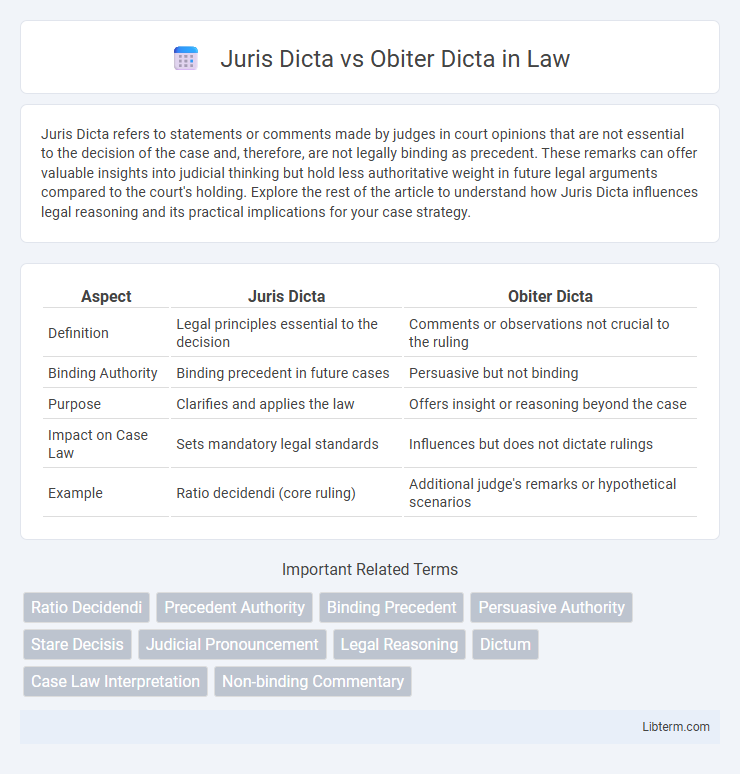Juris Dicta refers to statements or comments made by judges in court opinions that are not essential to the decision of the case and, therefore, are not legally binding as precedent. These remarks can offer valuable insights into judicial thinking but hold less authoritative weight in future legal arguments compared to the court's holding. Explore the rest of the article to understand how Juris Dicta influences legal reasoning and its practical implications for your case strategy.
Table of Comparison
| Aspect | Juris Dicta | Obiter Dicta |
|---|---|---|
| Definition | Legal principles essential to the decision | Comments or observations not crucial to the ruling |
| Binding Authority | Binding precedent in future cases | Persuasive but not binding |
| Purpose | Clarifies and applies the law | Offers insight or reasoning beyond the case |
| Impact on Case Law | Sets mandatory legal standards | Influences but does not dictate rulings |
| Example | Ratio decidendi (core ruling) | Additional judge's remarks or hypothetical scenarios |
Understanding Juris Dicta and Obiter Dicta
Juris dicta are authoritative statements within judicial opinions essential for deciding the case and establishing legal precedents, forming binding parts of the judgment. Obiter dicta are incidental remarks or observations made by judges that are not crucial to the case outcome and therefore hold persuasive but non-binding authority. Understanding the distinction helps legal practitioners identify which parts of a judgment serve as binding law versus influential commentary.
Defining Juris Dicta: Meaning and Scope
Juris Dicta refers to authoritative judicial statements essential for deciding a case, forming binding precedent within the court's jurisdiction. These legal principles directly affect the outcome of litigation, distinguishing them from mere observations. The scope of Juris Dicta encompasses rulings on points of law integral to case resolution, guiding future judgments and legal interpretation.
Obiter Dicta Explained: Definition and Examples
Obiter dicta are remarks or observations made by a judge in a legal opinion that are not essential to the decision and therefore not legally binding as precedent. These statements provide insight into the judge's thinking and can influence future cases, but they do not carry the authority of the court's ratio decidendi. Examples of obiter dicta include hypothetical scenarios or comments on related legal principles mentioned during the judgment.
Key Differences Between Juris Dicta and Obiter Dicta
Juris dicta are authoritative statements or legal principles essential to the court's decision, forming part of the binding precedent, whereas obiter dicta are remarks or observations made by a judge that are not crucial to the ruling and hold persuasive rather than binding authority. The key difference lies in their judicial weight: juris dicta directly influence the outcome and future cases, while obiter dicta provide insight or hypothetical reasoning without obligatory impact. Understanding this distinction clarifies how courts interpret legal precedents and the scope of judicial decisions in common law systems.
Legal Significance of Juris Dicta
Juris Dicta refers to statements of law that are essential to the decision in a case and hold binding precedent for future cases, shaping the legal framework and guiding judicial interpretation. The legal significance of Juris Dicta lies in its authoritative role, as courts must follow these rulings to ensure consistency and predictability in the law. This distinguishes Juris Dicta from Obiter Dicta, which are remarks or observations made by judges that are not essential to the case outcome and therefore do not carry binding authority.
The Role of Obiter Dicta in Judicial Reasoning
Obiter dicta serve as persuasive commentary within judicial opinions, offering insights beyond the binding ratio decidendi that can influence future cases. These statements provide judges with a broader legal perspective, helping shape evolving interpretations of law without carrying obligatory precedent weight. Courts often reference obiter dicta to support reasoning or signal potential legal developments, underscoring their important though non-binding role in judicial decision-making.
Impact of Juris Dicta on Precedent and Case Law
Juris dicta represent authoritative statements essential to the court's decision, directly shaping legal precedent and guiding future case law. These binding elements influence the interpretation and application of law by lower courts, ensuring consistency and predictability in judicial rulings. Unlike obiter dicta, which are persuasive but non-binding remarks, juris dicta form the core legal principles that establish precedent and drive the development of case law.
How Courts Treat Obiter Dicta vs Juris Dicta
Courts treat juris dicta as legally binding principles essential to the decision, forming precedent that must be followed in subsequent cases. Obiter dicta, by contrast, consist of statements or observations made in passing, which are not crucial to the court's ruling and therefore hold persuasive rather than binding authority. While juris dicta directly influence legal outcomes, obiter dicta may guide or inform future judicial reasoning without determining case law.
Notable Cases Illustrating Juris Dicta and Obiter Dicta
In the landmark case of Donoghue v Stevenson (1932), the ratio decidendi established the foundation of modern negligence law, illustrating juris dicta as the binding legal principle derived from the judgment. Conversely, in R v Howe (1987), obiter dicta on duress not amounting to a defense for murder provided influential but non-binding commentary shaping subsequent legal interpretations. These cases demonstrate how juris dicta forms the authoritative rule of law, whereas obiter dicta offers persuasive guidance for future judicial decisions.
Practical Implications for Legal Practitioners
Juris Dicta are authoritative statements essential to a court's decision and create binding precedent that legal practitioners must follow in subsequent cases to ensure consistent legal arguments. Obiter Dicta, though insightful observations or comments made by judges, do not hold binding authority but can influence persuasive arguments or provide guidance in legal strategy. Understanding the distinction allows lawyers to prioritize binding precedents from Juris Dicta while leveraging Obiter Dicta to anticipate judicial reasoning and strengthen case advocacy.
Juris Dicta Infographic

 libterm.com
libterm.com